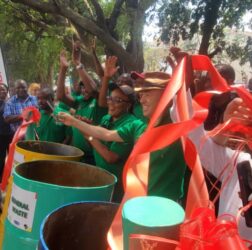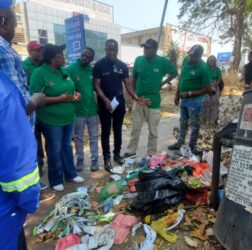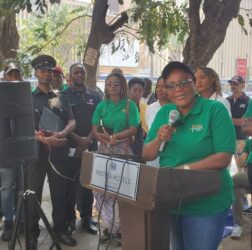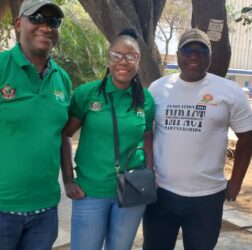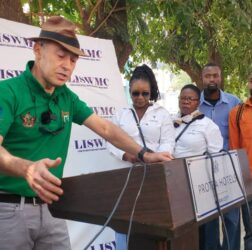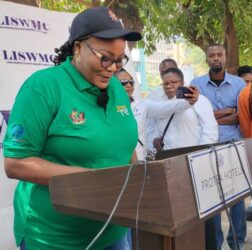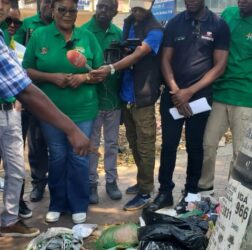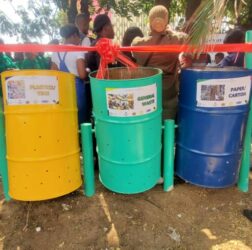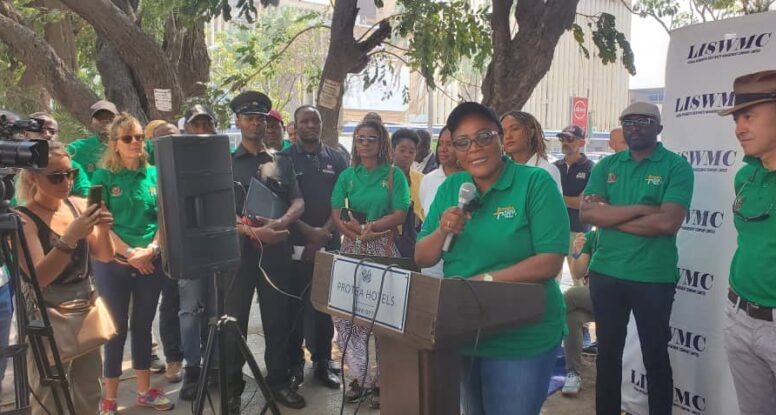
Waste No Waste!
[21/09/2024] Today, as I stood along Cairo Road in Lusaka right in front of Protea Hotel, witnessing the launch of color-separated trash bins, I couldn’t help but reflect on the transformative potential of such a simple act. Organized by the Italian Embassy and supported by partners like Dangote Cement, Protea Hotel, Ciela Resort, and many others, this initiative is more than just a neat display of colorful bins. It’s a wake-up call for Zambians, a reminder that the waste we often ignore can become something valuable, if only we care to separate it. Graced by His Excellency, the Italian Ambassador to Zambia, Mr. Enrico de Agostini, and Her Worship, the Mayor of Lusaka, Ms. Chilando Chitangala, this event was more than ceremonial. It sparked a much-needed conversation about how we handle waste at household, business, and school levels.
Ambassador de Agostini, with his popular phrase, “Waste No Waste, Trash is Treasure” challenged us to think about the opportunities we’re missing by failing to separate our waste. His words ring especially true in our local context. Zambia, like many countries, grapples with waste management issues. Mountains of trash grow in our streets and dump sites, while opportunities for recycling and repurposing are buried underneath. Yet, if we collectively adopted the habit of waste separation, the pathway to recycling, reuse, repurposing, and even energy production becomes clear.
Untapped Potential
In Zambia, the sight of improperly disposed waste is common. From household garbage casually tossed into mixed bins to businesses disposing of potentially valuable waste without thought, the idea of “waste separation” remains foreign to many. Yet, if we could embed this practice into the fabric of our daily lives, the rewards would be tremendous.
Imagine a society where every household separates their organic waste from plastics, paper, and metals. Organic waste could be composted and used for farming, especially in rural areas where agriculture plays a huge role in livelihoods. Plastics and metals could be collected by recycling businesses, creating jobs and reducing pollution. Paper waste could be repurposed into new products, sparking a circular economy where nothing goes to waste.
The bins launched along Cairo Road, managed by the Lusaka Integrated Solid Waste Management Company Limited (LISWMC), represent an opportunity for us to kickstart this revolution. However, it won’t succeed unless we as citizens play our part.
Changing the Mindset
The real challenge lies not in placing the bins but in changing the mindset. At the household level, many Zambians still see waste as a nuisance to be gotten rid of, rather than a resource. Education is key. We need to teach people that by separating their waste, they are contributing to something bigger—cleaner cities, new jobs, and even energy. Households can turn organic waste into compost, paper into reusable products, and plastics into recyclable materials. What was once an afterthought could turn into a daily practice.
For businesses, waste separation should become part of their corporate responsibility. Companies that embrace this practice can create new business opportunities while contributing to environmental sustainability. The partnership between the Italian Embassy and major organizations like Dangote Cement and Ciela Resort shows how business can lead in this space. Companies should actively engage in educating employees and customers about the benefits of separating waste, establishing systems within their operations to manage and recycle it efficiently.
Schools are perhaps the most important battleground in the fight for mindset change. Children are natural champions of new ideas. If schools adopt waste separation as a fundamental practice—providing bins for paper, plastics, and organic waste—students will take these habits home. Imagine a generation that grows up viewing waste not as trash but as treasure.
Creating Opportunities
The beauty of waste separation is that it doesn’t just solve environmental problems—it creates new opportunities. Recycling businesses can flourish, turning plastics into reusable materials and metals into products for the construction or art industries. Compost from organic waste can boost agricultural productivity, reducing our reliance on chemical fertilizers. Furthermore, energy production from waste is a largely untapped area in Zambia, and separating waste at the source can make this a viable business opportunity.
Supporting the growth of these industries means more jobs and a stronger economy. Small businesses can sprout from waste collection services, recycling centers, and composting facilities. More importantly, the practice of waste separation creates a circular economy where resources are reused, and nothing is wasted. As we saw today, numerous businesses are already supporting the push towards waste management. If the momentum continues, Zambia could become a regional leader in sustainable waste practices.
The Way Forward
The Italian Ambassador’s message was clear—waste separation makes recycling and repurposing much easier. But for it to work, everyone must play their part. We need to raise awareness at all levels of society, encouraging a shift in mindset that views waste not as a problem but as an opportunity. The businesses that supported today’s event—Dangote Cement, Protea Hotel, Ciela Resort, and many others—have set an example. Now, it’s up to the rest of us to follow suit.
As a sustainability and impact advocate, I left today’s event hopeful. Hopeful that the initiative we witnessed will be the beginning of a movement where Zambians everywhere take pride in separating waste, knowing they are contributing to a cleaner, more prosperous future. If we succeed in changing this mindset, we won’t just be planting trees or placing bins—we will be planting seeds of progress and turning trash into treasure for generations to come.
Let’s not waste the opportunity.

